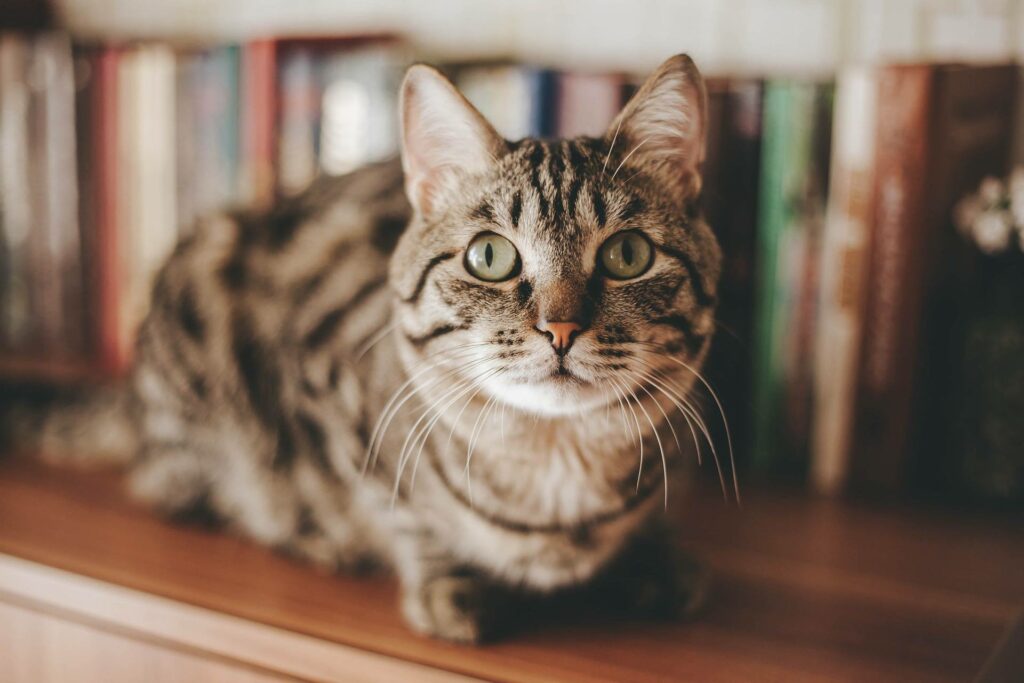Signs of a Stressed-out Cat
Share

Stress can trigger feline reactions ranging in severity from hiding to self-mutilation. Just as humans often need support during tough times, our feline friends could use a “helping hand” when they’re feeling anxious.
“Stress is a very big deal because it has a profound effect on all aspects of animals’ experience,” says Patricia B. McConnell, Ph.D., a certified applied animal behaviorist.
Is Stress Really That Serious in Cats?
Stress isn’t all bad in cats. In fact, our feline friends rely on a bit of stress when they’re hunting. This is perfectly normal for any predator – after all, hunting is stressful. That’s why your cat appreciates some simulated hunting on occasion. Extra stimulation isn’t all bad. But, if stress dramatically increases or is consistent, it can take a toll on your pet’s health.
“Chronic stress suppresses the immune response, causing a broad range of illnesses,” explains McConnell.
Washington State University’s College of Veterinary Medicine, for example, notes a link between stress and pancreatitis, which is an inflammation of the pancreas that can cause abdominal pain and may lead to other health problems in your cat.
Your cat’s health isn’t the only thing that stress impacts. Ongoing or sudden increases in stress may also influence your cat’s behavior. Cats are as individual as humans and react in different ways to stress.
Cats often develop fear-related responses. In some cats, it means hiding behavior. Others may become more aggressive than usual. Some cats stop self-grooming or eating , while others eliminate outside the litter box, groom excessively or become restless.
What Causes Stress in Cats?
Cats are pretty brave, but they also find a surprising amount of comfort in familiarity and routine. Change is one of the biggest culprits of feline stress.
This could mean a change in your cat’s environment (moving to a new home, for example or bringing in a new pet or person). Since social relationships are a defining part of your territorial cat’s life, any sign of an “intruder” may make kitty feel threatened and anxious.
While stress is often caused by outside factors, physical discomfort can contribute much stress to your cat too. Feeling pain without knowing why can be a terrifying experience for your feline. It’s important to consult your veterinarian if you suspect your cat is having issues.
How You Can Help Your Cat
If you suspect that stress-related discomfort is adversely affecting your cat’s life, here’s how to take action to relieve your pet’s stress:
Know the signs
Be observant of changes in your cat’s behavior. Look for body language that exhibits stress.

Visit a Veterinarian
Always take your pet to the doctor first, to rule out medical issues.
“Often, stress is related to crystals and urinary tract infections,” says McConnell. University of Edinburgh animal experts, for example, conducted an extensive study on cats and determined that stress may indeed trigger such problems in your cat’s urinary tract. These conditions are usually treatable when diagnosed early.
Be patient
If your cat is having trouble adjusting to a new home, take things slow. “Cats in the wild take a long time to decide where to live and where to hunt,” explains McConnell. “If your cat feels most comfortable under the bed for the first few weeks, it’s OK — take its food and water there.”
Do not force interaction
Introduce new pets slowly. Let new human housemates play with your cat while frequently offering food treats. When your cat doesn’t want to play, postpone the session. You should never force cats to do anything.
Establish a routine
Animals need to be able to anticipate events. It’s important to stay on a regular schedule for feeding times, play times, and work. Just adding a few events that your cat expects will help them regain control over their lives.
Offer mental exercise
Who said that tricks are only for dogs? Your cat can learn to high-five, sit up and fetch. Take them out for a walk in your yard on a leash or build them an enclosure. Exploring and learning are very important for your cat’s well-being.
Stress can impact your cat’s life as well as yours. If you believe your cat is stressed out, take action to help them. Everyone in your household will benefit. Remember, understanding, care and attention will go a long way toward reducing your cat’s excess stress!









